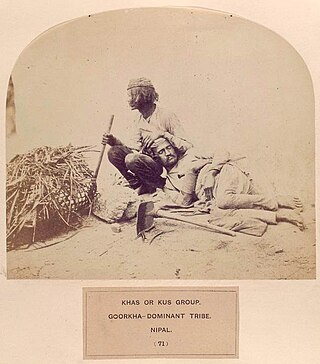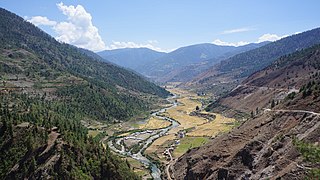Bisht is a surname found in the Indian state of Uttarakhand, Himachal Pradesh and country Nepal. The term "Bisht" originally referred to someone who held a land grant from the government. The Bisht families in Uttarakhand were chiefly Thokdars(Zamindars) of Thuljat origin. In Uttrakhand, Bishts are generally Kshatriya Rajputs. In Nepal, Bisht was adopted as a surname by Raute and Raji people. Bishta, as Bista, was also used as a surname used by Khas people, group under the caste Chhetri.

Khas people, popularly known as Khas Arya, are an Indo-Aryan ethno-linguistic group native to the Himalayan region of the Indian subcontinent, in what is now the present-day South Asian country of Nepal, as well as the Indian states of Uttarakhand, West Bengal and Sikkim. Historically, Khas were the speakers of an ancient Khas language from the Indo-Aryan language family and the earliest recorded speakers of the Western Pahari languages. The large portion of the Indo-Aryan speakers throughout lower Himalayas were the Khas people. An intrusion of this tribe from the Western and Northwestern Himalayas into Central Himalayas is substantiated by the early linguistic evidences related to the Nepali language. They were also known as Parbatiyas/Parbates and are currently known as Paharis/Pahadis.. They were also referred to as Yartse in Tibet and are also known as Khasan by Bhotia people. The term Khas has now become obsolete, as the Khas people have adopted communal identities because of the negative stereotypes associated with the term Khas. In Nepal the native speaker of Nepali language are known as Khas.

Khasas were an ancient Indo-Aryan tribe and a late Janapada kingdom from Himalayan regions of northern Indian subcontinent mentioned in the various historical Indian inscriptions and ancient Indian Hindu and Tibetan literatures. European sources described the Khasa tribe living in the Northwest Himalayas and the Roman geographer Pliny The Elder specifically described them as "Indian people". They were reported to have lived around Gandhara, Trigarta and Madra Kingdom as per the Mahabharata.

Chhetri, historically called Kshettriya or Kshetriya or Khas are Nepali speakers of Khas community, some of whom trace their origin to migration from medieval India. Chhetri was a caste of administrators, governor and military elites in the medieval Khas Kingdom and Gorkha Kingdom. The nobility of the Gorkha Kingdom mainly originated from Chhetri families. They also had a strong presence in civil administration affairs. The bulk of prime ministers of Nepal before the democratization of Nepal belonged to this caste as a result of the old Gorkhali aristocracy. Gorkha-based aristocratic Chhetri families included the Pande dynasty, the Basnyat dynasty, the Kunwar family, and the Thapa dynasty,.

Jumla District, is one of the ten districts of the Karnali province of Nepal. This district has Jumla as its headquarters, an area of 2,531 square kilometres (977 sq mi); it had populations of 89,427 and 108,921, respectively, in the national censuses of 2001 and 2011. Its territory lies between longitudes 81⁰ 28' and 82⁰ 18' East, and between latitudes 28⁰ 58' and 29⁰ 30' North.
Khasas were a north western tribe mentioned in the epic Mahabharata.
The Nepalese caste system was the traditional system of social stratification of Nepal. The Nepalese caste system broadly borrows the classical Hindu Chaturvarnashram model, consisting of four broad social classes or varna: Brahmin, Kshatriya, Vaishya, Sudra.
Karki (Devanagari/कार्की) is a Nepali/Kumaoni surname used by Khas people. It is found among the Chhetri community from Nepal. Karki was one of the titles of governmental posts in ancient Khasa kingdom. The tax collecting officers in Dara/Garkha had the governmental title of karki. There are various subgroups within the Karki family. 'Rikhle Karki', 'Lama Karki', 'Sutar Karki', 'Mudula Karki', 'Khulal Karki', 'Khaptari Karki', Rume Karki, 'Sinjapati Karki', 'Godar Karki', etc. are the clans of Karki. ].

Thapa is the surname commonly used by the Gorkhali community within India and Nepal. people belonging to the Chhetri caste. It is also used by the Magar group, a Sino-Tibetan speaking ethnicity.
Khadka, anciently called as Khaḍka, is a surname of Khas/Chhetri caste. Khadga was an ancient Paikelā (warrior) rank along with Thāpā, Rānā and Buḍhā chhetri.
The Pahari people, (Devanagari: पहाड़ी; IPA: [pɐɦaːɽiː]; Pahāṛ also called Pahadi and Parbati, are an indigenous group of the Himalayas. In Nepal, the Paharis constituted one of the largest indigenous ethnic group at about 8,000,000, or one-third of the Nepalese population through the 1990s. Most Indo-Aryan Paharis, however, identify as members of constituent subgroups and castes within the larger Pahari community such as Brahmin, Kshatriya and Dalits.
Magarat is considered to be the place settled and inhabited by Magars, one of the largest indigenous ethnic groups of Nepal. It is a geographical cluster of Federal Republic of Nepal which existed in the modern territory of Nepal before the Unification of Nepal by Prithivi Narayan Shah. It extended from the Budhigandki River the West.
Khasa-Malla kingdom, popularly known as Khasa Kingdom and Yatse in Tibetan, was a medieval kingdom from the modern day far-western Nepal and parts of Uttarakhand state in India, established around the 11th century. It was ruled by kings of Khasa tribe who bore the family name "Malla". The Khasa Malla kings ruled western parts of Nepal during 11th–14th century. The 954 AD Khajuraho Inscription of Dhaṇga states Khasa Kingdom equivalent to Gauda of Bengal and Gurjara-Pratihara dynasty.

Nepali is an Indo-Aryan language native to the Himalayas region of South Asia. It is the official, and most widely spoken, language of Nepal, where it also serves as a lingua franca. Nepali has official status in the Indian state of Sikkim and in the Gorkhaland Territorial Administration of West Bengal. It is spoken by about a quarter of Bhutan's population. Nepali also has a significant number of speakers in the states of Arunachal Pradesh, Assam, Himachal Pradesh, Manipur, Meghalaya, Mizoram and Uttarakhand. In Myanmar it is spoken by the Burmese Gurkhas. The Nepali diaspora in the Middle East, Brunei, Australia and worldwide also use the language. Nepali is spoken by approximately 16 million native speakers and another 9 million as a second language.

Karnali Province is one of the seven federal provinces of Nepal formed by the new constitution which was adopted on 20 September 2015. The total area of the province is 27,984 square kilometres (10,805 sq mi) covering 18.97% of the country, making it the largest province in Nepal. According to the 2011 Nepal census, the population of the province was 1,570,418, making it the least populous province in Nepal. It borders the Tibet Autonomous Region of China to the north, Gandaki Province to the east, Sudurpashchim Province to the west, and Lumbini Province to the south. Birendranagar with a population of 154,886 is both the province's capital and largest city.
Bista is a family name of people of Nepal belonging to Khas people group under the caste Chhetri, sub-groups of Kshatriya varna and the Bahun caste of Brahmin varna. They are Hindu with a local Masto deity. They speak Nepali language as mother tongue. In India, Bista/Bistas are spelled as Bisht/Bishts or Bist/Bists and are titled as Rajputs. They are mostly found in Indian state of Uttarakhand. Bista is also a surname belonging to the Brahmins of the Kumain Bahun subcaste.
Thakuri is a royal tribe of Nepal. It consists of the historical ruling class, and is made up of the descendants of the Great Khasa Malla kingdom rulers of the Baisi and Chaubisi principalities. The current royal family of Nepal also belong to this tribe.
Budha or Buda is a surname found in Nepal. Budha was an ancient title for a Paikela (warrior) in the Khasa kingdom. The title has been adapted as family name by Khas and Magar ethnicities. Notable people with the surname include:
Jharra Chhetri are the subgroup of the khas Chhetri caste who are socio-religiously considered the purest among all Chhetri subcastes. Jharra Chhetri wear the six threaded Janai. They are historically Indo Aryan people with concept of racial purity. Matwali Chhetri or Pawai Chhetri outnumber Jharras but notable people from Chhetri community are Jharras like Bogati, Basnet/Basnyat, Thapa, Karki, Kunwar, Khadka, Budathoki, Katuwal, Mahat.






